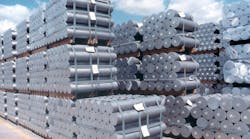According to the Canadian Plastics Industry Association (CPIA), fuel from burned plastics could prove a valuable and cost-effective energy source. However, the amount of plastics currently converted to energy is negligible and millions of tons of what could be valuable energy are going to waste.
A study commissioned by the CPIA, and conducted by the University of Waterloo's School of Planning, revealed that if the entire amount of non-recycled plastics that end up in Canada's landfills is converted to fuel, the produced energy would be enough to run 600,000 automobiles per year.
The idea of converting plastics into fuel is not new. The technology that can make this happen is called pyrolysis and represents the decomposition of organic materials without the presence of oxygen at high temperatures, reaching 400-600 degrees Celsius. Estimates show that one ton of non-recycled plastics can be converted into three barrels of oil by a fully-industrialized pyrolysis. If all non-recycled plastics in the country were to go through the process of pyrolysis, this would result in the annual production of nine million barrels of oil-equivalent hydrocarbons, with a total value of C$786 million (US$792.3 million).
RELATED: Coca-Cola launches project to develop fully plant-based bottle
Another possible approach could see plastics being separated from other waste and transported to special facilities, where the material would be burned to produce electricity, sufficient to meet the needs of up to half a million households for a year. This could lead to a drop in the country's annual coal consumption by 681,453 tons, researchers estimated.
Professor Murray Haight, one of the lead authors of the study, explained that hydrocarbons of which plastics consist are more valuable in terms of energy than coal and are almost as valuable as oil and natural gas. Putting this untapped resource into use should complement recycling, added CPIA Vice President Cathy Cirko in a press release.
Plastics are widely spread in various industries, including automotive and medical sectors, electronics, packaging and construction. After use, part of them could be recycled and reused for other purposes, whereas non-recycled plastics can be recovered and used as an energy-dense source. At present, there are technologies developed to convert plastics into electricity, crude oil and other fuels.
According to Carol Hochu, president and CEO of the CPIA, the study demonstrates the need for improved plastics recycling and better recoverability of energy value from non-recycled plastics. The study found that there are approximately 2.8 million tons of non-recycled plastics dumped into landfills, with Ontario alone accounting for more than one million tonnes, followed by Quebec, with 640,000 tons, and British Columbia and Alberta, with more than 390,000 and 320,000 tons respectively. The total amount of non-recycled plastics in landfills contains over 87 million gigajoules of energy, which equals the energy produced by 3.4 million tons of coal, 14 million barrels of oil or 79 billion cubic feet of natural gas.


